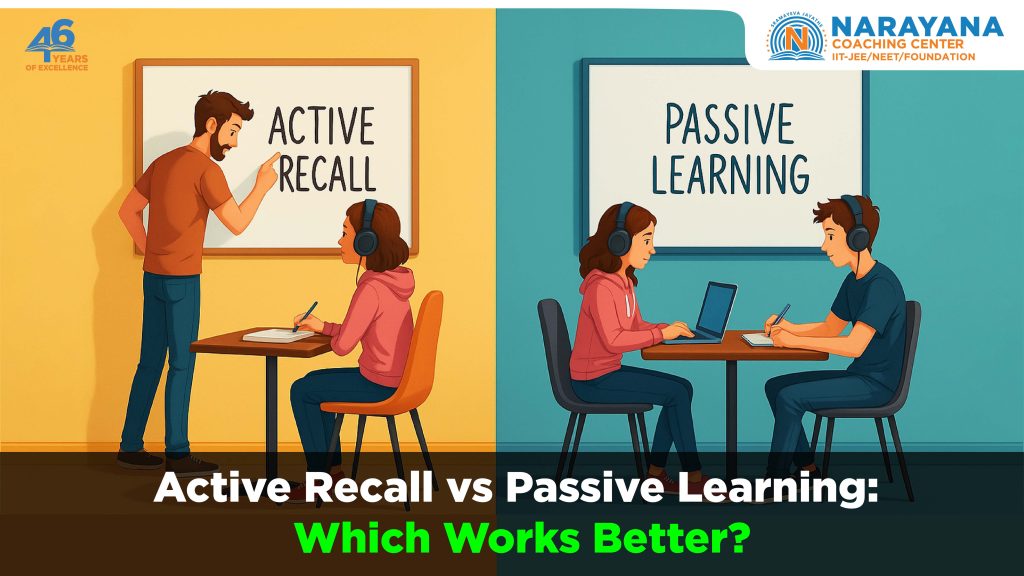
Preparing for JEE and NEET is not just about the number of hours you study — it’s about how you study. Two major learning methods dominate the academic world: active recall and passive learning. But which is more effective when you’re trying to master organic chemistry or solve complex calculus problems? In this blog, we break down the science behind each method and show why active recall is a game-changer for students in Classes 11 and 12.
What Is Passive Learning?
Definition
Passive learning involves absorbing information without actively engaging with the material. This includes:
- Reading textbooks repeatedly
- Watching lectures or tutorials
- Highlighting notes
- Listening to recordings
Pros
- Good for initial exposure to new topics
- Low effort; can be done when energy is low
Cons
- Low retention
- Creates a false sense of familiarity
- Ineffective for long-term mastery
What Is Active Recall?
Definition
Active recall is a high-engagement study technique where you force your brain to retrieve information from memory. This includes:
- Solving practice problems
- Using flashcards (like Anki)
- Teaching concepts aloud
- Answering past paper questions without notes
Pros
- High retention
- Strengthens memory pathways
- Reveals knowledge gaps instantly
Cons
- Mentally demanding
- Can feel slow initially
The Science Behind Active Recall
Cognitive science supports active recall through the testing effect, which proves that actively retrieving information enhances long-term retention more than re-reading or reviewing.
MRI studies show that active recall lights up multiple regions of the brain, creating deeper neural connections — essential for solving complex problems in Physics, Chemistry, and Math.
JEE/NEET Subjects & Learning Method Match
- Physics & Math (JEE): Active recall through problem-solving and derivations
- Biology (NEET): Flashcards and verbal recall for terminology and processes
- Chemistry: Use of concept maps and oral teaching for reactions and mechanisms
How to Use Active Recall Effectively
Spaced Repetition
Combine active recall with spaced repetition to review material just before you’re about to forget it. Tools like Anki or RemNote are ideal.
Use Past Year Papers
Attempt them in a timed, exam-like environment. This simulates pressure and promotes focused recall.
Teach What You Learn
Explain topics to a peer or even to yourself. If you can’t explain it, you haven’t mastered it.
Final Comparison Table
| Feature | Active Recall |
Passive Learning |
| Retention | High | Low |
| Engagement | High | Low |
| Time-Efficient | Yes (long-term) | No |
| Best For | Mastery & Exam Prep | First-time Exposure |
Conclusion
If you’re aiming for top ranks in JEE or NEET, it’s time to upgrade your learning methods. While passive learning can introduce concepts, it’s active recall that cements them in your brain. Combine both smartly, but let active recall drive your study engine.
FAQs
- Is active recall suitable for all subjects?
Yes, though the techniques vary by subject. Flashcards work for theory-heavy subjects, while practice questions suit numerical ones. - How do I start using active recall if I’m used to passive methods?
Start small: after reading a paragraph, close the book and recall what you learned. Build from there. - Is highlighting and reading bad?
Not bad, but ineffective alone. Use it only as a first step. - Can active recall help in board exams too?
Absolutely. It sharpens understanding and reduces revision time. - Are apps like Anki really helpful?
Yes! They use spaced repetition and active recall principles to improve long-term retention.
